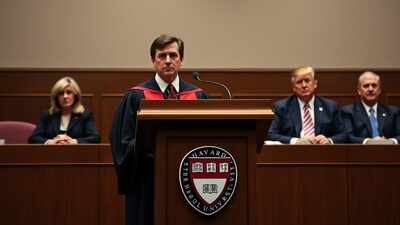Welcome To Latest IND >> Fastest World News
What Harvard could lose as its standoff with the Trump administration escalates. (AI Image)
Harvard University is facing a dire situation in its ongoing clash with the Trump administration, as federal funding for its critical research projects comes under severe threat. The dispute reached a boiling point after the administration announced a $2.2 billion freeze on grants to the institution, a move that could cripple research efforts across multiple disciplines. Harvard’s response has been resolute, rejecting the government’s demands to make sweeping changes to its leadership and policies. But the fallout could extend beyond the university, posing a potential risk to the US’s leadership in global scientific and technological innovation.
The standoff between Harvard and the Trump administration intensified on October 15, 2025, when the administration froze billions in federal funds over allegations of antisemitism and political activism on campus. The freeze affects a wide range of ongoing projects, including cutting-edge research in areas like cancer, infectious diseases, and spaceflight. Harvard, which relies heavily on federal funding, particularly from the NIH, now faces the reality of stalled projects and lost opportunities. The move represents a significant escalation in what has become a broader cultural and political battle over the role of elite universities in US society.
Harvard braces for major financial hit
As reported by The Washington Post, Harvard borrowed $750 million from Wall Street last week to shore up its finances in preparation for potential cuts. This decision highlights the gravity of the situation. Federal funding is a major source of revenue for the university, with $686 million from federal sources constituting about 68 percent of its total sponsored revenue in fiscal year 2024.
However, this financial cushion may not be enough to offset the potential losses, especially as the $2.2 billion freeze includes critical research grants supporting projects at the forefront of US biomedical and technological innovation. Harvard has already been forced to stop work on major contracts, including a $60 million contract focused on tuberculosis research, as quoted by The Washington Post. “To have to euthanize these animals is so morally repugnant to me,” said Sarah Fortune, a professor at Harvard T.H. Chan School of Public Health, in reference to halted research on nonhuman primates.
US research at risk
Harvard is not alone in facing the consequences of this funding freeze. The university’s research collaborations span multiple institutions across the country, making the impact of the cuts ripple across the US scientific community. The freeze affects ongoing work in critical areas like infectious diseases, cancer, and even the impact of spaceflight on human biology, potentially jeopardizing the future of
US scientific leadership
.
The Trump administration’s decision comes after the Joint Task Force to Combat Anti-Semitism reviewed nearly $9 billion in federal funding to Harvard and its affiliates. In a letter sent to the university, the administration demanded extensive changes, including increased government oversight, compliance with federal immigration laws, and reforms to student disciplinary actions. Harvard, which has faced mounting pressure over allegations of antisemitism on campus, responded by insisting on its independence. “We will not surrender our independence or relinquish our constitutional rights,” said Harvard President Alan M. Garber, as quoted by The Washington Post.
A battle over US values
The ongoing confrontation has sparked intense debate about the role of universities in shaping national policies. Critics argue that Harvard, with its $53 billion endowment, should be more responsive to government demands, especially in times of political and social unrest. White House press secretary Karoline Leavitt questioned why US taxpayers should subsidize a wealthy institution like Harvard, as reported by The Washington Post. On the other hand, supporters of the university warn that yielding to political pressure could have dangerous implications for
academic freedom
and the pursuit of truth.
Ultimately, the outcome of this battle could set a precedent for how the US government interacts with elite institutions. If the Trump administration succeeds in forcing changes at Harvard, it could pave the way for broader political influence over academic and scientific pursuits, threatening the very foundation of US research and innovation.
In the face of these challenges, Harvard has vowed to continue its fight, determined not to compromise its independence or its commitment to global scientific leadership. However, with billions in federal funds now in limbo, the stakes for both the university and the broader US research community have never been higher.
Latest IND
